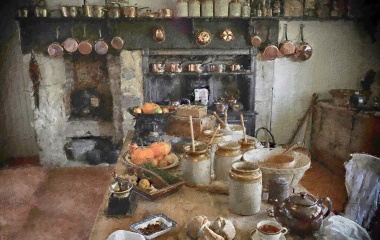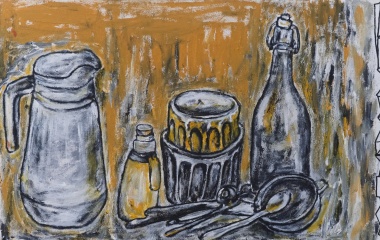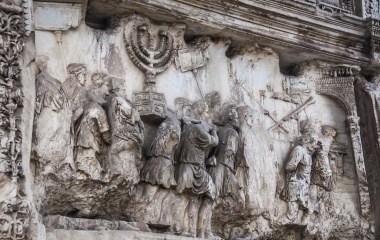
It is doubtful the Jewish life would exist as we know it if not for the leadership of Rav Yochanan ben Zackai. Seeing the terrible infighting that had beset the Jewish people, he realized that a rebuilding process was necessary. That rebuilding was to take place in the coastal town of Yavneh, ushering in the flourishing of rabbinic law, and ultimately the Talmud. It was a decision that haunted him his entire life—after all, he willingly conceded Jerusalem and the Temple to the Romans—but arguably the most important post-biblical decision of Jewish history.
“When the Temple was destroyed, Rav Yochanan ben Zackai[1] ordained that one can accept testimony for the new month all day” (Beitza 5a). In Talmudic times when the calendar was based on the declaration of the beit din, court, one could not know whether the 30th day of a month would be declared as Rosh Chodesh, converting it to day one of the next month. With Rosh Hashanah on the first of the month, come the evening after the 29th day of Elul, one had to act in accordance with the laws of Rosh Hashanah. Whether or not it was truly Rosh Hashanah might not be known until just before sunset on the next day. If not, then Rosh Hashanah would be observed a second time on the morrow[2].
“One time the witnesses delayed in arriving[3] and the Levites were confused as to the song; they made a decree that witnesses would only be accepted until the mincha [sacrifice]”. As part of the Temple service, the Levites would sing a chapter of Psalms. As witnesses had not come by mid-afternoon, the Levites sang the song for a weekday as part of the mincha service. Yet with witnesses arriving later in the day, it retroactively turns out that they should have sung the song for Rosh Hashanah. To prevent this type of “error”, it was decided that the beit din would ‘close early’, and if the witnesses had not come by then, Rosh Hashanah would be the next day[4].
Once the Temple was destroyed and there were no more songs to be sung, Rav Yochanan ben Zackai reestablished the original law accepting witnesses until sunset. This seems to be a nice historical vignette with no practical significance. However, such is not necessarily so. The Talmud explains that with witnesses being accepted the entire day, an egg laid on the first day of Rosh Hashanah could now be eaten on the second. His decree meant the observance of the second day of Rosh Hashanah was once again a matter of doubt as to whether the beit din had declared a new month. As a matter of doubt, an egg born on the first day may be eaten on the second day—either the second day is not really Yom Tov, or if it is, the egg was laid on the day before Yom Tov.
Rav Yosef disagrees with this assessment. “Something established by a quorum needs a quorum to repeal it”.
In demonstrating this principle, the Talmud presents two biblical precedents. The first relates to the prohibition to cohabit with one’s wife in the three days prior to receiving the Torah. Once the Torah was given, such was no longer applicable. Nonetheless, the Torah specifically noted that “they can return to their tents”, i.e., married life. Perhaps our relationship was G-d was so intense that the Jewish people as a whole were to limit time spent with their families in order to focus almost exclusively on G-d—something that was demanded of Moshe, and no one else. Yet Judaism understood that it is only through married life that one can fully enter into a relationship with G-d.
The second example focuses on Jerusalem’s beauty. The law of netah revai requires that fruit of a four-year-old tree[5] be eaten in Jerusalem, or that a monetary equivalent equal to 125%[6] of their value be spent on food in Jerusalem. Yet, in order “to beautify the marketplaces (streets) of Jerusalem with fruit”, the Sages ordained that those who lived within one day’s walking distance of Jerusalem must bring their actual fruit to Jerusalem. Once the “city was in ruins why should we beautify it for the sake of foreigners?” (Rashi 5b, s.v. taamah). Yet the Gemara says if not for the fact that Rav Yochanan ben Zackai had convened a special assembly to repeal this law, it would have still applied—despite its non-relevance.
Legal theory teaches that law takes on a life and authority of its own. A legal system requires that even after a law is no longer applicable, it must remain on the books until it is officially repealed. Depending on where and when one lives, that may be Congress, Parliament, the Knesset, or the Sanhedrin. It is this show of respect for law that gives all law its authority.
[1] Rav Yochanan ben Zackai set up a series of reminders—most famously, taking the lulav for seven days—so that we not only remember the destruction of the Temple, but also the glory of the Temple when it stood.
[2] As only those in the immediate vicinity would know whether the new moon had been declared, the practice soon emerged that all kept two days of Rosh Hashanah. It is one thing knowing in advance that one must keep two days of Rosh Hashanah. But to go through an entire day not knowing if it’s just a dress rehearsal seems to me much more difficult.
[3] With the moon most visible at night, generally, witnesses would arrive early in the morning, so that the new moon and new year would be declared in the morning.
[4] Although the remainder of the day was now definitively a regular day, they continued to observe the day in “holiness”, with work being forbidden (though presumably the remaining tefilot would be of a regular day).
[5] All fruit tress had their birthday on Tu b’Shevat, so we are talking about the fruit that blossomed from one Tu b’Shevat to the next.
[6] While the Torah requires, we add a chomesh, a fifth. Biblical math used an “outer” fifth. If we add 25% to fruit worth $100, then the $25 extra is 1/5 of the total.



